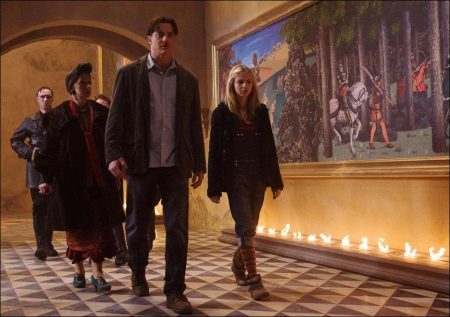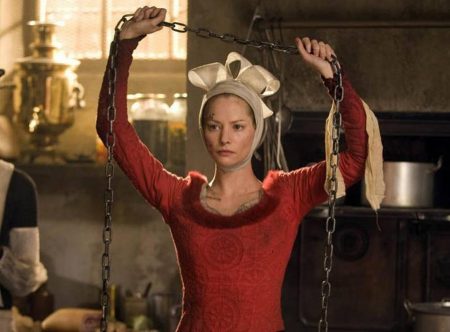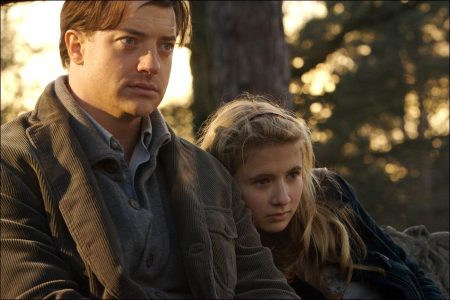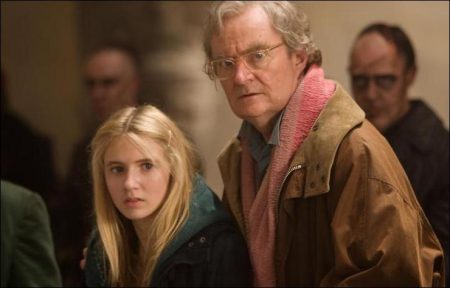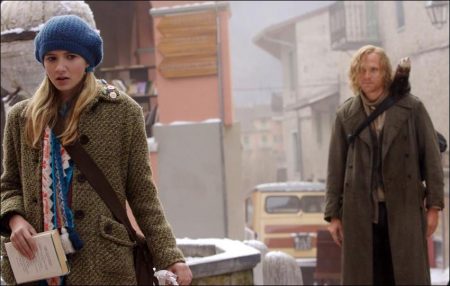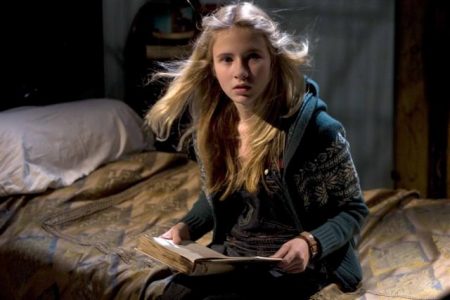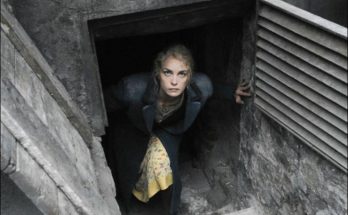Tagline: Every story ever written is just waiting to become real.
Based on the book by Cornelia Funke, Inkheart is a timeless adventure tale of imagination that centers on Meggie, a young girl whose father has a secret ability to bring characters from books to life when he reads them aloud. But when a power-hungry villain from a rare children’s fable kidnaps Meggie’s father to bring others out of the boundaries of fiction, she and a disparate group of friends both real and magic embark on the kind of adventure she has only read about in books to save him and set things right.
Mo Folchart (Brendan Fraiser) drags his daughter Meggie (Eliza Hope Bennet) all around the world. At the last home, an old enigmatic acquaintence of Mo’s shows up named Dustfinger (Paul Bettany). All of a sudden the next morning Mo packs up and leaves with Meggie without telling her what is going on. They travel to Meggie’s Great Aunt Eleanor’s (Helen Mirren) house to stay at. Then one night a bunch of thugs arrive at the ohouse and kidnap Mo to take him to see Capricorn (Andy Serkis), a cruel and evil dictator. Meggie soon finds out that Mo has the ability to read characters out of books. The only drawback is that when he brings something out of a story, something must go back in to replace it. this is how maggie lost her mother Theresa (guillory) and Capricorn and Dustfinger are characters from a book called Inkheart.
Inkheart is a 2008 British-American-German fantasy adventure film directed by Iain Softley, produced by Cornelia Funke, Dylan Cuva, Sarah Wang, Ute Leonhardt, Toby Emmerich, Mark Ordesky, Ileen Maisel and Andrew Licht, written by David Lindsay-Abaire, music composed by Javier Navarrete and starring Brendan Fraser, Eliza Bennett, Paul Bettany, Helen Mirren, Andy Serkis, Jim Broadbent, and Sienna Guillory.
It is based on Cornelia Funke’s novel of the same name. The film was released theatrically on December 12, 2008, in the UK and January 23, 2009, in the USA by New Line Cinema. Inkheart received generally mixed reviews from critics and grossed earned $62,450,361 on a $60 million budget. Inkheart was released on DVD and Blu-ray in the United Kingdom on April 13, 2009. On January 12, 2009, a video game based on the film was released for the Nintendo DS.
About the Production
“This is the story you’ve been waiting to hear.”
“What are the boundaries between what is real and what is imagined?” asks “Inkheart” director Iain Softley. “That’s something in which I’ve always been interested—the way that fantasy can impinge on the real world. And when you are talking about books and stories, especially in the mind of a child or an adolescent, then those boundaries between reality and imagination are even more fascinating to explore. One of the things that appealed to me about ‘Inkheart’ is that it’s a story that bridges the everyday and fantasy realms.”
The film “Inkheart” is based on a best-selling book of the same name by internationally acclaimed author Cornelia Funke. An instant sensation when it was published in 2004, Inkheart became a #1 New York Times bestseller, spending a total of 70 weeks on the list and going on to be translated into 37 languages. The first novel in Funke’s Inkworld trilogy, Inkheart was followed by Inkspell, published in 2005, and the latest book, Inkdeath, which was just published in 2008. In 2005, Funke, who has written nearly 50 books, was named one of Time magazine’s “Most Influential People of the Year.”
“Inkheart” charts the adventures of Mortimer “Mo” Folchart and his daughter, Meggie, as they battle the evil forces of a fictional world—forces Mo himself inadvertently called forth from the pages of a fantastical story by reading it aloud.
While the thought of characters springing to life at the mere mention of their names could be perceived as a cautionary tale, Brendan Fraser, who plays the part of Mo, counters, “I think ‘Inkheart’ advocates the written word read aloud. To have people read aloud to one another is quite powerful—parents to children, children to adults, teachers to children, children to each other… It’s an interesting notion that something real might come out of the story, but if the listener actually believes it in their imagination, it might as well be real. There is always room for a story that relies on the power of literature.”
Producer Diana Pokorny knows exactly how much of an impact the novel has had on young readers. “My daughters are voracious readers and my eldest daughter’s favorite book is Inkheart. She knows the book backwards and forwards and talked incessantly about it, so it really did seem fateful that I would get the opportunity to be a part of the film. For me, it is a story about the love of reading and the power of books, but, more importantly, it is a story about home and family. And as the mother of two ardent fans, and as a fan myself, it was quite magical to see those words that we loved to read so much as a family actually come to life.”
Softley, who also served as a producer on the film, notes, “Cornelia provided us with such rich material that bringing it to life was the easy part. She created a wonderful, magical adventure, and her vivid descriptions and illustrations enabled us to step into her book within a book.”
Funke, who produced the film with Softley and Pokorny, says that she knew Softley was the ideal person to take the helm in bringing her book to the screen. “‘The Wings of the Dove’ is one of my all-time favorite movies, one of the most brilliant film adaptations of a book I’ve ever seen. So when I heard that Iain was interested in directing ‘Inkheart,’ I was thrilled. I knew he wouldn’t back away from the darker elements of the story, but would nevertheless fill it with warmth. He is an excellent actors’ director, but he’s also one of the most visual directors with an exceptional feeling for texture and color. I could not imagine a better choice for ‘Inkheart.’”
Together with executive producer Ileen Maisel, Funke was also instrumental in the choice of David Lindsay-Abaire to adapt her novel. The author worked closely with him throughout the course of crafting the screenplay, which was “a very interesting process for me as a writer,” she says. “I believe if you stick too closely to a book, it can paralyze you creatively. I knew David loved the book, so I wanted to free him from being too faithful to it. I said, ‘Just go for the heart,’ and when I finally saw the script, it was a magical moment. It was a thrill for me to see my story through the eyes of another artist. That is the greatest privilege of being a storyteller — to have the opportunity to work with so many incredibly gifted people to tell my story again in a different way. What a kick!”
“I was very eager to work with Cornelia,” Lindsay-Abaire states. “I had read the book a couple of times and relished every page of it. It’s a terrific story, filled with adventure and characters that were wonderfully rich and fun to explore, and I loved how complicated many of the relationships between them are. But I was mostly drawn to what Inkheart says about the power of books and storytelling. I was honored to be entrusted with adapting it and felt a strong obligation to stay true to the spirit and tone of her book. She and I were in constant contact while I was writing the screenplay. Some things inevitably change from page to screen because they are very different mediums, but it was important to me that Cornelia be a part of the process and approve the choices we made. It’s her baby, after all.”
Softley remarks, “One of the things I really look for in a script is if I can see the film in my head, and that was definitely the case with this one. As I was turning the pages, I couldn’t wait to know what was going to happen next. The characters leapt off the page, really fascinating, diverse characters, each with his or her own distinct attributes.”
“I prefer a story that has the good sense to stay on the page where it belongs.”
For Funke, the casting of Brendan Fraser as Mo was the fulfillment of her original vision for the character. “Brendan inspired this character from the very beginning,” the author reveals. “I pictured Mo with Brendan’s face and Brendan’s voice. He has an exceptionally beautiful and expressive voice, which is very important for this character.” Very important, because, in the world of “Inkheart,” Mo is known as a “Silvertongue”—someone who can speak the written word into reality.
Fraser recalls being surprised and honored when he was told of his connection to the character long before there was even a screenplay. “I first learned about the book Inkheart when Cornelia sent me a copy with an inscription that read, ‘Thank you for inspiring this character. I hope that you can read it aloud to your kids one day and enjoy it.’ I was so flattered I didn’t know how to respond except to thank her. We became acquainted over the next few months and, needless to say, it was a privilege for me to help her realize the journey of this character.”
Softley relates that as casting for the movie commenced, “Brendan was already part of the project from Cornelia’s point of view. But when he heard I was going to direct the film, he flew to London and said, ‘You’re the director; it has to be your choice. I would like the role, but I don’t want it to be a fait accompli. If you don’t think I’m right for it, I wouldn’t want to do it.’ I thought that was incredibly gracious, but I actually agreed with Cornelia that he was very much the right person for the part. Brendan had all the characteristics that I saw in Mo, and they really shined through. He’s played action hero roles and is an obviously strong presence on the screen. But he also has an incredibly sympathetic quality to him, which is very appropriate for Mo.”
Mo has been hiding a secret from his young daughter, Meggie. “Her mother disappeared under mysterious circumstances nine years ago due to Mo’s strange ability to make real anything printed when he reads aloud,” Fraser offers.
“Innocently enough, he was reading Meggie a bedtime story from an obscure book they found called Inkheart…and something terrible happened. Three of the book’s characters came to life and then disappeared into the night. But there was a trade off: his wife and Meggie’s mother, Resa, went into the book. And that’s what sent Mo on his expedition to find Resa and set things right.”
Unfortunately for Mo, the characters released from Inkheart stole his only copy of the book. Nine years later, he is still searching through the dusty shelves of bookstores far and wide, hunting for his only hope: another copy of Inkheart.
Only three years old when her mother vanished, Meggie has no memory of that fateful night. And though she knows Mo is keeping something important from her, she never could have imagined the truth about her father’s amazing gift…a gift she inherited.
Meggie is played by British actress Eliza Hope Bennett, who won the role over hundreds of other young hopefuls. Describing her character, Bennett says, “Meggie is a bookworm like her father, but he does not allow her to read aloud, which frustrates her because she doesn’t know why. She also has a natural curiosity about her mother, but if she ever brings her up to Mo, he instantly shuts her down, so she knows not to push it. She’s always been very dependent on her father because he’s the only parent she’s had, but I think over the course of the film she is forced to become more independent. She grows up quite a lot by the end of the story.”
The close relationship between Mo and Meggie was mirrored by the actors playing them. “When I first met Brendan, I knew it was extremely important that we got on because Meggie and Mo have such a strong relationship. He was so warm and welcoming to me, we got along immediately. I found it really easy to treat him as my father because he treated me as if I were his daughter. He was just so nice and really caring.”
Fraser has equal praise for his co-star, saying, “It was a privilege to be working with a young person who is so intelligent and thoughtful and so enthusiastic about her work. She’s remarkably talented as an actress, which is evident, but as a person, she’s just a terrific kid. It’s going to be exciting to see where she goes from here, but I think we’re going to be seeing a great deal more of her in the years to come.”
Softley agrees, noting, “There is something about Eliza that is very understated, very natural. She was just so effortlessly who Meggie was. And working with her was such a pleasure. She always knew her lines perfectly and was able to take direction very quickly. She was a joy.”
Certainly the filmmakers considered it one of their biggest casting coups to have secured Oscar winner Helen Mirren for the role of Meggie’s great-aunt Elinor. “To me, Elinor was a gift of a part—wonderfully amusing and with a great story arc,” says Softley. “Right from the start, Helen was at the top of my list. I’ve always admired her work and wanted an opportunity to work with her.”
Nevertheless, Pokorny admits, the timing might not have worked out following Mirren’s “royal” year. “In the wake of the success of ‘The Queen,’ we were naturally concerned that she would not be available,” the producer recalls. “As it turned out, though, she not only enjoyed the script but also had marvelous ideas for the character of Elinor. We were so fortunate to have her and couldn’t imagine anyone else playing the role.”
Mirren says that, in keeping with Elinor’s great love of books, her ideas for her character began with a literary figure. “I based my character on poet Edith Sitwell, who is famously quoted as saying that her hobbies were ‘reading, listening to music and silence.’ I think that’s where Elinor starts out—she’s buried herself in books and finds all the excitement she needs there.”
Softley adds, “Helen felt there should be more emphasis on Elinor as a lover of reading as much as a lover of books. Elinor was a collector of books because she wanted to read, not because she loved the artifacts. To me that was a brilliant idea because it brought to the fore something that was very evident in the book—the notion that books offer remarkable worlds to escape into that are in many ways as real as the one that we live in.”
Mirren has that viewpoint in common with her role. “Ultimately, books do have one major advantage over film. Film can lay it all out for you, but there is nothing like the power of your own imagination. So I loved the concept of playing with the whole idea of what is real and what is imagined and blurring the line between the two. Elinor is obsessed with the world of literature, but when that world literally becomes real to her, she thinks it’s outrageous and, of course, she can’t cope with that at all,” Mirren laughs.
The actress reveals that she was a bit nervous meeting Cornelia Funke, having, as she says, “changed the direction of the character somewhat.” But she needn’t have worried. Funke responds, “It was a dream to cast Helen Mirren as Elinor and I absolutely loved her interpretation of the role.”
For another Oscar-winning member of the cast, meeting Funke was something of a surreal moment. Jim Broadbent plays the role of Fenoglio, the fictional author of Inkheart, the book within the film. He describes meeting the author who first created his character as “a strange sort of parallel experience because she was there seeing all her characters come to life in much the same way that Fenoglio is seeing his characters come to life. It was very valuable for me to see her excitement at seeing us and the world that had been designed and built. I could use that in expressing how Fenoglio would react to the situation. For Fenoglio,” Broadbent continues, “it’s a writer’s dream come true because characters he’s created have come into his world and he can interact with them.”
“It was wonderful to have Jim create that almost childlike sense of joy that Fenoglio has when he encounters his creations,” Softley asserts. “The first time I read the script, I said Jim Broadbent should be Fenoglio and everyone agreed. I just think there’s an understated eccentricity about Jim that was appropriate for the part.”
Broadbent says his decision to accept a role comes down to a simple formula: “If I think it’s a film I’d want to see then I want to be in it, and this was a story that excited my imagination at every turn.”
Mo and Meggie track down Fenoglio in hopes of finding any remaining copies of the book Inkheart. Mo believes that if he finds the book, he will be able to rescue his long-lost wife, Resa, played in the film by Sienna Guillory. Guillory comments, “The thing I loved about Resa was that she wasn’t your typical damsel in distress. She’s been held in this parallel universe for nine years, but she has never given up on her hope of escaping and being reunited with her family.”
“I know my characters are so lifelike that they seem to jump off the page, but it’s simply not possible.”
The night that Resa disappeared into Inkheart was the night that Mo released three very different characters from its pages: the homesick fire juggler Dustfinger, the evil Capricorn, and his knife-wielding confederate, Basta.
Dustfinger is played by Paul Bettany, who offers, “It was interesting that when I was offered the role it coincided with my son reading the book, so it was a lovely, joyous time for me.”
“From the beginning,” Softley states, “Paul was the person I had thought of for Dustfinger. He has that mercurial and mischievous quality that Dustfinger has. And he played his emotional scenes with great depth and understanding.”
Bettany’s understanding came from a place of affinity with the character. “He wants to get out of this incredibly odd place and back to his home with his wife and kids,” the actor explains. “I realized that is very similar to how I spend part of my life—making a movie in some far-flung location, wishing I could get home to see my family. So I found I had a lot in common with Dustfinger.”
However, Dustfinger has one attribute Bettany did not share: the ability to juggle fire. Bettany gamely tried to learn to juggle, starting with regular juggling balls, but says, “I soon realized that if this man is supposed to be the best juggler on the face of the Earth—at least in Inkworld—I simply wasn’t going to achieve that. So we did a different thing called poi.”
Poi is a form of juggling originated by the Maori people of New Zealand. Instead of tossing objects in the air, they are attached to ropes or chains and the juggler swings them in circular patterns. “I had two great lads teaching me how to do it,” Bettany says. “Mostly I had to learn to avoid smacking myself endlessly. It’s a painful learning curve, but a fast one because it really concentrates the mind,” he deadpans.
Through the years that Mo has been hunting for Inkheart, Dustfinger has never been far behind. He believes that if Mo finds the book, he will finally have a way back to the home and family he loves. Unfortunately, Mo refuses to help Dustfinger, afraid that if he reads from the book, he might lose another loved one to its pages. So Dustfinger turns to a dangerous ally who was also brought forth from Inkheart: the villainous Capricorn.
Unlike Dustfinger, Capricorn has no interest in returning to his fantasy home. Cast in the role, Andy Serkis observes that his character “didn’t have much going for him in Inkworld, but he discovers he can build an empire in the real world and has delusions of grandeur. He loves everything about this place, where everything he lays his hands on is much more preferable, especially the material gains. He was used to sleeping in forests with the beasts; now he lives in a castle and has become acutely aware of fashion.”
The actor says that the contrast between two different milieus was also what drew him to the project. “I was excited about the project when I read the script. I thought it was a fantastic story, and I loved the duality of the real world versus the fantasy world.”
“I had been interested in working with Andy since I saw him as Gollum in ‘The Lord of the Rings,’” says Softley. “Capricorn is a deceptively difficult part. On one level, he is the deliciously wicked villain of the piece and has to provide a level of jeopardy for our main characters. But he also has a lot of amusing lines and is something of an entertainer. That can be quite a difficult balance to strike, but Andy handled it brilliantly.”
Capricorn has several uses for Mo’s talents as a Silvertongue, some of them mercenary. “We discover that Capricorn has made a splendid life for himself in this world,” Pokorny notes. “But now he wants Mo to bring him greater riches by reading them out of other books.”
There are fortunes to be found in many books, but Capricorn chooses the hidden treasure of 1001 Arabian Nights. As Mo reads aloud, gold, silver and jewels rain down…but that’s not all: a young boy named Farid suddenly appears, terrified at being transported from an ancient desert cave to this strange new place.
Farid is played by young actor Rafi Gavron, who comments, “At first, Farid is completely bemused. He’s looking around, asking, ‘Where am I? What is this?’ Wouldn’t you be if you suddenly landed in a completely different world, thousands of years later? He tries to convince himself he’s dreaming, but when things start to fascinate him, it’s like ‘Wow.’ He sees a motorbike and says, ‘Well that beats a camel,’”
Gavron laughs. “Eventually, with the help of Meggie, he becomes part of the group that’s trying to save the day, and he also ends up finding a friend in Dustfinger. I had most of my scenes with Paul Bettany and he is hilarious, just full of jokes and gags. It was great. We all had so much fun.”
Softley remarks, “One of the real benefits of having gotten together the group of actors we did was that they all enjoyed one another so much. When everyone is getting along and having a good time, it makes everything so much easier.”
Capricorn rules over his small empire with the help of his henchmen, led by Basta, whose weapon of choice is a knife. Jamie Foreman plays Basta, who is quick to leave his mark on anyone who crosses him or his leader. But Capricorn needed more muscle, so he went back to the source. Somehow he has found another Silvertongue: a timid little man named Darius, played by John Thomson.
Capricorn forces Darius to “read out” several of his old friends from Inkheart, including Flatnose, played by Steve Speirs; Fulvio, played by Stephen Graham; Cockerell, played by Matt King; and Mortola, played by Lesley Sharp. Darius also brings forth a variety of fairytale characters and mythological creatures from such classics as The Wizard of Oz and Peter Pan.
Unfortunately, Darius has a speech impediment that directly impacts his powers as a Silvertongue: he stutters. As a result, anyone and anything Darius speaks out of books is less than perfect, as mostly evidenced by the lines of writing left scrawled on them as they were bounced through the pages. The telltale words were the idea of costume designer Verity Hawkes, who worked with makeup and hair designer Jenny Shircore to complete the look.
To carry out his evil plan—to call upon his most terrifying and powerful ally—Capricorn needs a Silvertongue whose abilities are not compromised. But when Mo escapes his grasp, the villain is delighted to discover that there is another within his reach… Meggie.
“It looks like the picture in the book.”
Principal photography on “Inkheart” began on location in Liguria, Italy, which is also where Cornelia Funke’s original story unfolds. “I made a decision early on that I wanted to use real places,” Softley says. “When I went back to the book, I discovered it was set in Liguria and I thought it would be even better to make the film where the story takes place. While scouting the area, we could see that the landscape and geography had incredible variety; the combination of mountain villages and seaside towns provided the perfect backdrop for all the exteriors in the film. It is a real world on one level, but it has jumping-off points into the fantastic.”
Funke had actually lived in the area for several months and says she found it to be a magical place. “I remember being so impressed that if you travel to the mountains, you could be in a quite modern, tourist area, and then five minutes later you feel like you’re in the Middle Ages. You turn the corner and you seem to fall out of time. So when I thought about the idea of characters who had come out of a medieval tale then finding a lair hidden in the mountains, it made so much sense to set the story in Liguria. It also gave me the chance to write a love letter to the region.”
Marking their fifth film together, production designer John Beard worked with Softley to create sets that would bridge the realms of reality and imagination. Softley notes, “The first thing I did was to get out there with John and do some photographic research so we could absorb the atmosphere of the location. We found antiquated hilltop towns that completely transport you back to a storybook past.”
Pokorny says, “I think the collaboration between Iain and John is extraordinary. They have made so many films together that they have a shared vision, and you see it in every set.”
The producer continues, “Iain was very clear that he wanted to work in practical environments, as opposed to using a lot of green screen, so John and his team created really fantastic sets that made us all feel like we were stepping into another world. Our visual effects department did amazing work in enhancing or creating certain things, but for the most part, all of our scenes were accomplished in places our actors could see and touch.”
“When we went to all the locations, we felt the cold and the sense of history around us, and that has an impact,” Brendan Fraser attests. “To actually be in the place adds a sense of authenticity that you can’t fabricate. You can’t beat the real thing.”
The film’s more intangible elements—including a well-timed twister and the terrifying specter of the Shadow—were rendered by the visual effects group, led by visual effects supervisor Angus Bickerton.
Verity Hawkes’ costume designs also reflected the integration of two distinct domains. “Iain wanted a very timeless feel, so the clothes are not set in a particular period,” she offers. “Brendan’s and Eliza’s costumes were contemporary, but with a slightly period silhouette. Helen Mirren had a lot of input into her wardrobe in keeping with her inspiration of Edith Sitwell, which I thought was genius.”
For Dustfinger, Hawkes states, “He wasn’t going to come from a medieval world and suddenly dress in jeans and a t-shirt. I wanted him to look like he had chosen clothes that would allow him to blend, but there was still something unique and out of place about him.”
The fashion-conscious Capricorn wears a suit that Hawkes describes as “much more GQ. We had this very tailored black suit, black shirt look going on for him.”
When location filming was completed in Italy, the production moved to soundstages at Shepperton Studios in England, where most of the interior shots were done.
Funke visited the set on several occasions and Softley remarks, “It was fantastic having Cornelia on set because she was so enthusiastic about the film. She just embraced the re-interpretation of it and was very supportive of everything we did. You could see in her face that she was very excited to see her characters and her ideas being brought to life.”
For Funke, being so intimately involved in the big-screen adaptation of her novel was a rich and rewarding experience. She reflects, “Even for a writer it is difficult to find words for such an experience—enchanting, overwhelming, magical, unforgettable…all that is true. What I saw was so close to what I had envisioned in my head that I suspected Iain Softley and all the other amazing artists found a secret door to my imagination,” she smiles. “Some things were different, but then I would think, ‘Oh yes! That’s how it should look.’ What greater gift can an author be given by other artists?”
Inkheart (2009)
Directed by: Iain Softley
Starring by: Brendan Fraser, Eliza Hope Paul Bettany, Eliza Hope Bennett, Jim Broadbent, Helen Mirren, Andy Serkis, Rafi Gavron, Sienna Guillory, Mirabel O’Keefe
Screenplay by: David Lindsay-Abaire
Production Design by: John Beard
Cinematography by: Roger Pratt
Film Editing by: Martin Walsh
Costume Design by: Verity Hawkes
Set Decoration by: Niamh Coulter
Art Direction by: Dimitri Capuani, Andrea Faini, Rod McLean
Music by: Javier Navarrete
MPAA Rating: PG for fantasy adventure action, some scary moments and brief language.
Distributed by: New Line Cinema
Release Date: January 23, 2009
Views: 96
